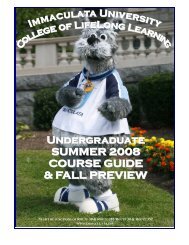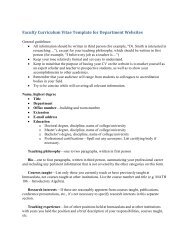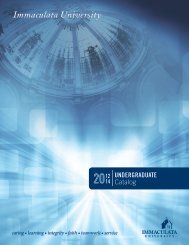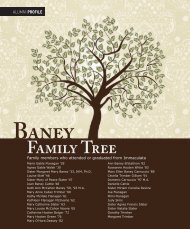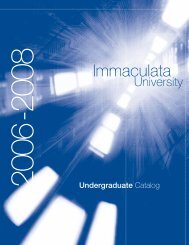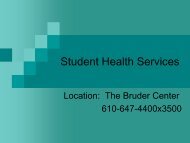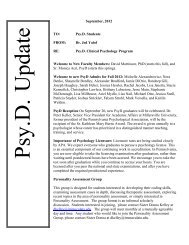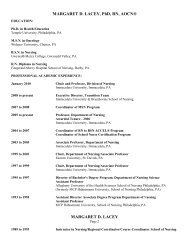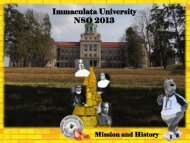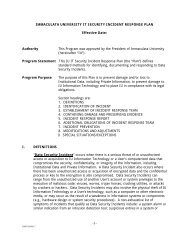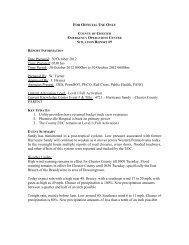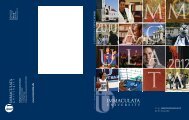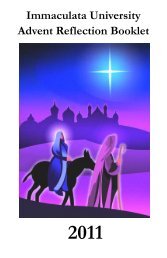Undergraduate Catalog 2008-2010 - Immaculata University
Undergraduate Catalog 2008-2010 - Immaculata University
Undergraduate Catalog 2008-2010 - Immaculata University
Create successful ePaper yourself
Turn your PDF publications into a flip-book with our unique Google optimized e-Paper software.
Mathematics—<br />
Computer Science—Physics<br />
Valerie Martin, Chair<br />
Sister Marie Cooper<br />
Mary Elizabeth Jones<br />
Molli R. Jones<br />
John Koeppe<br />
Sister Regina Mauricia DeFeo<br />
Sister Ann M. Heath<br />
OUTCOMES<br />
• to form systematic, orderly, and exact habits of thought<br />
• to develop the power of reasoning<br />
• to enable students to see the place of mathematics and<br />
technology in shaping the future<br />
• to provide the necessary background for work in mathematics,<br />
in computer science, in information technology, and in the<br />
natural and social sciences<br />
• to provide the fundamental education and training necessary for<br />
graduate study or for careers in mathematics, computer science,<br />
information technology and the natural and social sciences<br />
REQUIREMENTS FOR MAJOR IN<br />
MATHEMATICS (BA)<br />
Required of all candidates: MATH 216, 304, 305, 307, 310, 311,<br />
314, 410; PHY 203-204+; CIS 105. Further requirements depend<br />
on the particular concentration chosen.<br />
• Mathematics: MATH 315, 409, and CIS 218.<br />
• Mathematics for Secondary Level Educators: MATH 312;<br />
two mathematics courses numbered 300 or above* (See<br />
Education: Requirements for SecondaryEducation Certification).<br />
• Mathematics with Elementary or Early Childhood or<br />
Special Education Educators: MATH 312, one mathematics<br />
course numbered 300 or above*; CIS 201 (See Education<br />
Department: Requirements for Elementary and Early<br />
Childhood Education Certification).<br />
This program will only be available to students (CUS and<br />
CLL) who begin study on or prior to September, 2009 and who<br />
are eligible for PDE certification prior to January 1, 2013<br />
*MATH 301-302 may not be used to satisfy this requirement.<br />
+PHY 201-202 may substitute with departmental permission.<br />
REQUIREMENTS FOR MAJOR IN<br />
MATHEMATICS-COMPUTER SCIENCE (BS)<br />
MATH 216, 304, 310, 311, 409; CIS 105, 218, 224, 231, 325, 326,<br />
331, 335, 404, 410. PHY 203, 204; 3 elective credits in<br />
mathematics and/or computer science, which may include MATH<br />
305, 307, 308, 350, 400; CIS 214, 215, 230, 317, 327, 328, 330,<br />
402, 403, 404, 405, 408.<br />
REQUIREMENTS FOR MAJORS IN<br />
INFORMATION TECHNOLOGY<br />
Required of all BS candidates: CIS 105, 214, 218, 224, 230, 231,<br />
325, 330, 331, 335, 402, 404, 409, 410; MATH 216, and MATH 203<br />
or 207 or 301; Physics 208; and COM 250.<br />
• Information Technology (BS).<br />
• Information Technology (BS) with Elementary Education<br />
(See Education Department: Requirements for Elementary Education.)<br />
This program will only be available to students (CUS and<br />
CLL) who begin study on or prior to September, 2009 and who<br />
are eligible for PDE certification prior to January 1, 2013<br />
• Information Technology in Business (BA) an accelerated degree<br />
completion program: CIS 213, 221, 223, 225, 309, 310, 311, 312,<br />
335; CCS 341; ENG 240; MATH 103; ORG 307, 342, 344, 345,<br />
383; THE 381. Requirements beyond ACCEL ® program by<br />
advisement to complete liberal arts core courses and electives as<br />
needed for a total of 126 credits<br />
REQUIREMENTS FOR BACHELOR OF ARTS IN<br />
INFORMATION TECHNOLOGY IN BUSINESS,<br />
an accelerated degree completion program: Computer Science<br />
213, 221, 223, 225, 309, 310, 311, 312, 335; Cross Cultural Studies<br />
341; English 240; Mathematics 103; Organization Dynamics 307,<br />
342, 344, 345, 383; Theology 381. Requirements beyond ACCEL ®<br />
program by advisement to complete liberal arts core courses and<br />
electives as needed for a total of 126 credits.<br />
REQUIREMENTS FOR ASSOCIATE OF<br />
SCIENCE<br />
• Information Technology (AS) : MATH 216 and one of the<br />
following: MATH 203, or 207, or 301; CIS 105, 202, 214, 230,<br />
nine hours chosen from CIS 218, 224, 230, 231, 325, 327,<br />
328, 330, 331, 335, 402, 403, 404; COM 250, and PHY 208.<br />
REQUIREMENTS FOR MINOR<br />
• Mathematics: 18 semester hours to include: MATH 301-302<br />
or 207-208, 216; three courses chosen from MATH 304, 305,<br />
307, 308, 309, 310, 311, 312, 320, 350 or 400.<br />
• Information Technology: 18 semester hours to include the<br />
following requiredcourses: CIS 105, 214, 230, 231; and 6<br />
elective hours chosen from CIS 202, 218, 224, 325, 327, 328,<br />
330, 331, 335, 342, 402, 403, 404, 405; PHY 208; COM 250.<br />
CERTIFICATE IN INFORMATION TECHNOLOGY<br />
• Requirements: 18 semester hours to include the following:<br />
CIS 105, 214, 230; 9 elective hours chosen from departmental<br />
computer science offerings: CIS 218, 224, 231, 325, 327, 330,<br />
331, 335, 402, 403, 404.<br />
MATHEMATICS<br />
MATH 101 Basic College Mathematics I (3)<br />
Survey course for prospective elementary teachers and students<br />
majoring in non-science fields. Concepts and applications of problem<br />
solving, sets, logic, properties of numbers, probability, and statistics.<br />
MATH 102 Basic College Mathematics II (3)<br />
Survey course for prospective elementary teachers and students<br />
majoring in non-science fields. Concepts and applications of<br />
number systems, algebra, geometry, and consumer mathematics.<br />
(MATH 102 may be taken without having had MATH 101)<br />
MATH 106 Introductory Algebra (3)<br />
Introduction to the language of algebra, discussion of the real<br />
number system, extensive practice in algebraic techniques, solving<br />
and graphing linear and quadratic equations, application of concepts<br />
to problem solving. (Designed for students who need more<br />
mathematical background prior to entering MATH 203-204)<br />
MATH 151 Applied College Mathematics I (3)<br />
An applied mathematics course designed for students majoring<br />
in non-science fields. The goal of this survey course is to<br />
demonstrate the use of mathematics and quantitative reasoning in<br />
solving real-life problems. Topics covered include: logic, set<br />
theory, probability, and statistics. (This course requires confidence<br />
in arithmetic, and some basic knowledge of algebra)<br />
79



